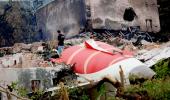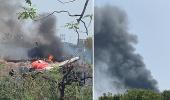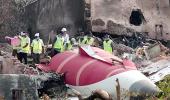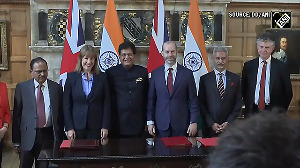'...rectification has to happen then and there, and that takes additional time.'

The Directorate General of Civil Aviation (DGCA) on Tuesday, June 17, 2025, said it did not find any major safety issues with Air India's Boeing 787 Dreamliner fleet, following an intensive four-day inspection prompted by a fatal crash last week.
However, the civil aviation regulator flagged concerns about recent maintenance-related issues that had been contributing to delays across the airline's network.
At least 13 international flights of Air India were cancelled and several others took off way behind the schedule on Tuesday primarily due to mandatory safety inspections of Boeing 787 aircraft.
Operational stress was compounded by weather-related disruptions, airspace restrictions, and crew duty-time limitations, all of which added further strain to the airline's wide-body network.
The DGCA, in a statement late in the evening, noted that it had examined 26 of Air India's 33 Dreamliners between June 13 and June 17, with the aircraft and their maintenance systems found compliant with safety regulations.
'The recent surveillance conducted on Air India's Boeing 787 fleet did not reveal any major safety concerns,' the regulator said.
It advised the Tata group airline to improve internal coordination between engineering, operations, and ground handling teams, and to ensure adequate availability of spare parts to reduce passenger inconvenience.
The DGCA had ordered 'enhanced safety inspections' for all 33 Dreamliners in the airline's fleet after the crash last Thursday, when an Air India B787 flying to London went down shortly after take-off from Ahmedabad.
By 3 pm on Tuesday, 24 aircraft had successfully completed the mandated checks. Two more were expected to have cleared the checks by the end of the day. One aircraft was scheduled for inspection on Wednesday.
Four aircraft undergoing heavy maintenance will be checked before their release, while two others grounded in Delhi shall be inspected before re-entering service, the regulator said.
'A more systematic and real-time defect reporting mechanism is required to ensure that safety-critical departments receive timely updates,' the DGCA noted, adding that this would help strengthen decision-making and reduce disruptions.
The regulator also reviewed the wider operational challenges facing the aviation sector following recent airspace restrictions, especially over Iran, which have forced rerouting and delayed flights.
Airlines were advised to keep passengers informed and explore alternative routing options to reduce the fallout.
Together, Air India and Air India Express operate over 1,000 flights daily.
The DGCA reiterated its direction to both carriers to strictly follow passenger facilitation norms and keep flyers adequately informed in the event of delays or cancellations.
The DGCA also reviewed recent operational data on Air India's wide-body operations, with focus on the Boeing 787 fleet, which has seen a number of cancellations over the past several days.
On June 12, the day of the crash, Air India operated 50 B787 flights and cancelled five.
The number of cancellations rose significantly in the following days: On June 13, the airline operated 41 B787 flights while 11 were cancelled; on June 14, it operated 47 such flights and cancelled 12.
The trend continued on June 15, with 41 operated and 14 cancelled, followed by 39 operated and 11 cancelled on June 16.
Between midnight and 3 PM on June 17, Air India operated just 30 Dreamliner flights, cancelling 13.
These operational figures indicate continued disruption to the wide-body schedule, even as DGCA inspections progressed.
The regulator said it will continue to monitor the performance of all scheduled airlines closely.
Speaking on the spate of cancellations and delays, a senior Air India executive said: "It's not that every cancellation is due to the safety inspections, but there's no denying that the fleet-wide checks have strained availability and turnaround times."
On Tuesday, Air India cancelled flight AI143 from Delhi to Paris after its pre-flight checks identified an issue.
'The mandatory pre-flight checks identified an issue which is being presently addressed. However, in view of the flight coming under the restrictions on night operations at Paris Charles de Gaulle airport, the said flight has been cancelled,' the airline said.
The return flight from Paris to Delhi on June 18 was also cancelled as a result.
Flight AI159 from Ahmedabad to London Gatwick was cancelled due to longer-than-usual turnaround times.
In a separate statement, the airline clarified: 'Flight AI159 from Ahmedabad to Gatwick has been cancelled today due to the unavailability of the aircraft, resulting from airspace restrictions and additional precautionary checks, and not due to any technical snag as claimed.'
Air India added that it had arranged alternative travel, hotel stays, and full refunds or rescheduling for passengers.
Other affected services on Tuesday included cancellations of AI153 (Delhi-Vienna), AI133 (Bengaluru-London), and AI915 (Delhi-Dubai).
AI145 (Goa-London) faced a delay of over 90 minutes, while AI148 (Paris-Delhi) and AI2026 (Frankfurt-Delhi) were delayed by about two hours each.
The Sydney-Delhi flight (AI301) departed more than two and a half hours behind schedule. Domestically, flight AI424 from Ahmedabad to Delhi was delayed by over five hours.
The ripple effect has extended to scheduled services for Wednesday, with AI169 (Amritsar-London Gatwick), AI151 (Delhi-Zurich), and AI308 (Delhi-Melbourne) all cancelled.
According to another Air India official, the inspection process itself was taking time.
"If the checks find anything even slightly off, rectification has to happen then and there, and that takes additional time," the person said.
Further complications arose when such delays caused flight crews to exceed Flight Duty Time Limitations (FDTL), which are a set of mandatory limits on how many hours pilots and cabin crew can be on duty or fly within a given period, designed to ensure they are adequately rested.
If a crew runs out of FDTL hours, the flight must be delayed or cancelled unless a replacement crew is available.
Unfavourable weather in several parts of the country, including Delhi, as well as ongoing airspace restrictions over Pakistan and parts of West Asia amid the Israel-Iran conflict, further narrowed operational flexibility on Tuesday.
Air India did not respond to Business Standard's query on this matter till press time.
Feature Presentation: Ashish Narsale/Rediff












